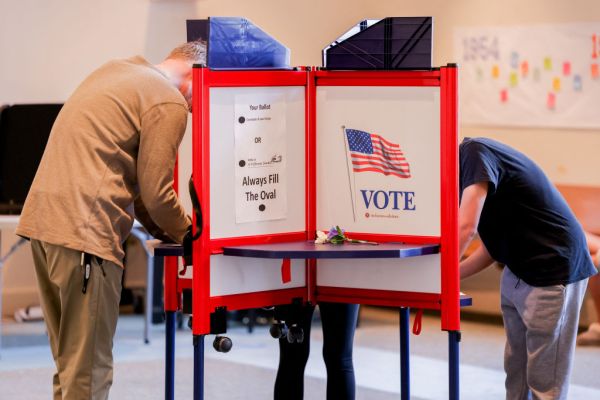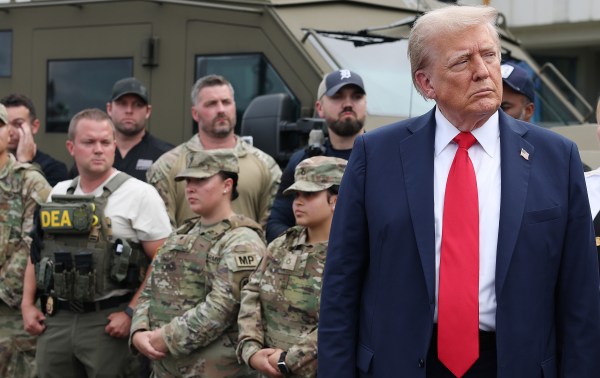A viral video claims that Republicans used Starlink—a satellite internet provider owned by Elon Musk—to rig vote counting in the swing states.
In the 9 minute video that has been shared on X, TikTok user “etheria77” claims that Starlink satellite internet devices were used to tabulate votes in swing states during the election. “Swing states were able to use Starlink in order to tally up and to count ballot votes, or voting ballots, in their state,” she says. The video goes on to explain that Starlink devices were sent to states by Elon Musk, and that the Linux operating system leveraged by Starlink would be incapable of counting votes for both candidates.
The claim is false. Starlink systems—which provide internet connectivity through a constellation of thousands of satellites orbiting the Earth—were used by election officials in some states to improve internet connectivity at rural polling locations. However, Starlink is not a tabulation system and was not used to count or transmit votes in the swing states.
Election jurisdictions across the country use various methods to cast and count ballots, including hand-marked paper ballots, ballot marking devices (BMDs), optical scanners, and direct recording electronic (DRE) systems. These systems are audited and approved by each state prior to Election Day, and—with very few exceptions—do not involve an active internet connection.
“Neither Starlink nor other types of communication networks play any role in counting votes. Most votes are tallied on scanners that don’t have internet connections, and then election officials use memory cards to transfer the results to the central tabulator,” Pamela Smith, president and CEO of Verified Voting—a nonprofit focused on the responsible use of election technology—told The Dispatch Fact Check in an email. “The scanners also produce printed records of their vote totals prior to transmittal. Most states, including all the so-called swing states, use paper ballots or records that voters can verify, and routinely examine some of these ballots by hand to check the counts. Our elections produce huge quantities of physical evidence. A satellite system like Starlink cannot steal that.”
Some elements of election administration, however, do rely on internet connectivity. Many states use electronic poll books (EPBs) or statewide voter registration databases to check voters in, confirm their registration and ballot type, check signatures, and ensure that voters have not already cast ballots elsewhere. Real-time internet connectivity is not required to run electronic poll books in all cases, but some states rely on stable internet connections for their systems to operate. “Starlink provided connectivity in a number of jurisdictions for EPBs in this election,” Smith said.
In Arizona, for example, several voting jurisdictions leveraged Starlink systems, alongside traditional internet solutions and FirstNet internet trucks, to improve internet connectivity for their EPBs. “As part of a pilot program to enhance connectivity in underserved areas, our office has deployed Starlink systems in Coconino, Apache, and Navajo Counties to support ePollbook synchronization,” a representative for the Arizona secretary of state’s office told The Dispatch Fact Check in an email. Arizona’s ballot tabulation devices, however, were not connected to the internet, and official results could not have been altered by Starlink.
Starlink’s use was not widespread, and other swing states, such as North Carolina and Pennsylvania, didn’t employ the technology at all. “Satellite-based internet devices were not used to tabulate or upload vote counts in North Carolina,” a representative for the North Carolina State Board of Elections told The Dispatch Fact Check in an email. “In addition, our tabulated results are encrypted from source to destination, preventing results from being modified in transit. We have no evidence of any alteration of votes by anyone.”
Pennsylvania officials sent a similar confirmation. “Counties do not use Starlink to transmit unofficial or official election results,” a Pennsylvania Department of State representative told The Dispatch Fact Check in an email. “No voting system in Pennsylvania is ever connected to the internet.”
The Dispatch Fact Check did not receive a response from election officials in Georgia, Michigan, Nevada, or Wisconsin.
If you have a claim you would like to see us fact check, please send us an email at factcheck@thedispatch.com. If you would like to suggest a correction to this piece or any other Dispatch article, please email corrections@thedispatch.com.











Please note that we at The Dispatch hold ourselves, our work, and our commenters to a higher standard than other places on the internet. We welcome comments that foster genuine debate or discussion—including comments critical of us or our work—but responses that include ad hominem attacks on fellow Dispatch members or are intended to stoke fear and anger may be moderated.
With your membership, you only have the ability to comment on The Morning Dispatch articles. Consider upgrading to join the conversation everywhere.